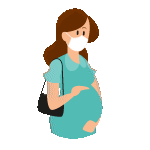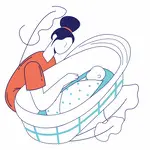Adjusting to everyday life after the birth of your baby has its own challenges, especially if you’re a first-time mother. Although it’s important to care for your baby, you also must take care of yourself too. Most new mothers don’t resume work for at least the first six weeks post baby’s birth - this period allows new mothers to adjust and adapt to the routine of having a new human in their life. Since a baby must be fed and changed often, you may experience sleepless nights. It can be frustrating and tiresome. The good news is that you will eventually fall into a routine. Whether you deliver naturally or through c-sec, taking care of your post-partum body is as important as taking care of your new born - strict adherence to good diet, good rest and post-delivery hygiene is very necessary. In the meantime, here is what you can do for an easier transition
General Do’s:
- Adequate rest is the master key to recover from all sort of problem post-delivery. If you strain yourself too much, you may bleed longer or start bleeding again after your lochia (The original bloody vaginal discharge post-delivery is called as “lochia” which gradually decreases and changes to pink, then brown and finally to yellow) has already lightened or gone away. After childbirth, new mothers are likely to get into depression, commonly known as “postpartum depression” and it happens due to lack of rest in new mothers, though many factors are responsible for postpartum depression, but inadequate rest remains the main cause so it’s very important to take proper care and time for yourself
- If you have delivered normally, you need to take care of your episiotomy stitches. The area needs to be dry and the wound should be dressed regularly till it heals completely
- You will experience vaginal soreness whether you had an episiotomy-a natural tear, or even if you did not have both. Expect this soreness to last anywhere from a day to a few weeks
- Change your menstrual pad every 4 hours, lessens the risk of any kind of infection
- Urinating and pooping may be difficult and painful for few initial days. Drink lots of water, it only helps soften your stool, making them easier to pass. Eat food that is rich in fiber, also helps in passing easier & softer stool
- Sit on a pillow or a padded ring. Lie down every few hours to relieve the pressure that is usually on your perineum when you are in a sitting or standing position. Move slowly and carefully, your moves should not allow the wound to open. Backache is the most common complaint in the postpartum phase. Support your back with a pillow while breastfeeding or whenever you are in sitting position.
- Maintain proper posture while breastfeeding, using feeding pillows helps a lot
- Support your wounds with hands while doing activities that require high pressure like coughing or sneezing
- Hormonal changes in a new mom’s body play havoc, there are times you will feel like hurting your baby or crying for no reason, this basically is the onset of postpartum depression. Consult an expert if these symptoms stay with you for more than two weeks. Join groups on social media for new mothers, share your woes, it which will help you come out of this state. Indulge yourself in new hobby like reading a book, drawing, painting, etc. whichever distracts you from such thoughts
- Stay positive and surround yourself with people who make you happy. Don’t hesitate to ask for help from your near and dear ones. Trust me people love to help a new mom
- Don’t worry about your house being in a mess, hire a help if you can afford
- If everything is fine, you can resume exercising the way you did before conceiving. You can start 6 months after a Cesarean section and 3 months after a normal delivery
Don’ts
- Don’t strain or lift/carry heavy objects. Don't stoop down while picking up anything, squat down and then pick it up.
- Don’t strain yourself while pooping. The muscles you use for pooping are the same muscles that you overexerted during childbirth
- Don’t engage in high impact exercises and activities. No matter how quickly you want to get rid of those tummy bulges, your body needs time to recover, so the exercise will have to wait till complete recovery
- Don’t wear clothes that are tight around the lower part like belly or crotch. Not only will these be uncomfortable, it also increases the risk of infection
- Don’t engage in sexual activities before consulting your doctor




















